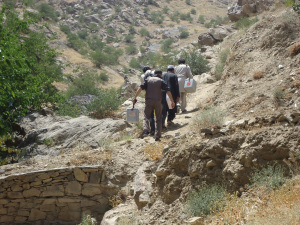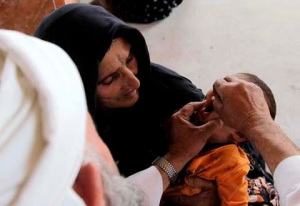The coverage results are in, and show that the first round of a vaccination campaign in Afghanistan has already reached a remarkable 5.7 million children with measles vaccine.
In mid-July, more than 27,000 health workers, volunteers and community mobilizers spanned 16 provinces in Afghanistan in a week-long drive to help stop transmission of measles and polio in the country under a WHO and UNICEF-supported government campaign.
The first phase of the campaign targeted children between nine months and 10 years of age with one dose of measles. As a new innovation for the country, health workers also gave children under 10 oral polio vaccine, increasing the pool of children immunized against the disease.
Mohammad Taufiq Mashal, the General-Director of Preventive Medicine at the Ministry of Health noted: “Children received doses of measles vaccine in public places such as mosques, schools and parks. The response of the people to this campaign was quite heartening and they extended all possible cooperation to make it a success.”
 Measles continues to be a serious public health problem in Afghanistan. Since November 2011, WHO and the Ministry of Public Health have reported 8,953 cases of measles – an almost three-fold increase in the number of measles cases as compared with the same period in 2010-2011. Eighty-four per cent of reported measles cases were under 10 years, and 34 per cent of the cases were between five and 10 years of age.
Measles continues to be a serious public health problem in Afghanistan. Since November 2011, WHO and the Ministry of Public Health have reported 8,953 cases of measles – an almost three-fold increase in the number of measles cases as compared with the same period in 2010-2011. Eighty-four per cent of reported measles cases were under 10 years, and 34 per cent of the cases were between five and 10 years of age.
“Despite the progress made in increasing coverage, work remains to be done to increase routine measles coverage and prevent further outbreaks,” said Dr Abdul Shakoor Waciqi, Senior Medical Officer with the Expanded Program on Immunization at WHO Afghanistan. “We expect an increase in the following months of acute watery diarrhoeal cases amongst children. Afghanistan also faces high prevalence of malnutrition among children under five. These factors contribute to an increase in mortality amongst measles patients, which is already close to 5 per cent,” Dr Shakoor added.
Strengths of an integrated campaign
WHO Afghanistan also underscored the benefits of integrating polio and measles vaccination campaigns.
“Events like the measles drive represent a key opportunity to promote strategic integration between measles and polio – building up on the polio teams knowledge and extensive network, the measles campaign provided two drops of anti-polio vaccine to children up to 10 years,” said Dr Quddus Arshad, Polio Team Leader at WHO. “The two programs can mutually benefit from each other through a piggy-back approach and knowledge sharing.”
Access and Security
The challenge of access and ensuring the safety of measles and polio vaccinators is also a priority to partners working in national immunization programmes. WHO says that there has been deterioration in access and increased displacement, particularly in the Southern region.
However, the measles elimination programme is building up its access capacity thanks to the lessons learned from polio. Several measures are progressively being implemented including strengthening outreach with community leaders, increasing the quota of women vaccinators in order to promote acceptance among communities and promoting peace dialogues, particularly in highly insecure areas.
 WHO and UNICEF are the lead partners of the Ministry of Public Health in the efforts towards achieving a measles, and polio-free Afghanistan. The second phase of the campaign in the remaining 18 provinces is scheduled to start in October. The government hopes to vaccinate a further 4.6 million children aged between nine months and 10 years against measles, and close to 5 million children under the age of 10 against polio.
WHO and UNICEF are the lead partners of the Ministry of Public Health in the efforts towards achieving a measles, and polio-free Afghanistan. The second phase of the campaign in the remaining 18 provinces is scheduled to start in October. The government hopes to vaccinate a further 4.6 million children aged between nine months and 10 years against measles, and close to 5 million children under the age of 10 against polio.
Afghanistan, with the WHO Eastern Mediterranean region has committed to eliminate measles by the end of 2015. The country started its first measles elimination drive in a nationwide campaign in 2001, and then through two follow-up measles vaccination campaigns in 2006 and 2009.




















 Prelude Version 2.3.2
Prelude Version 2.3.2